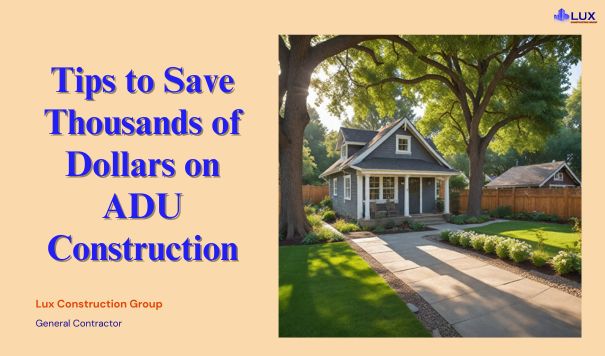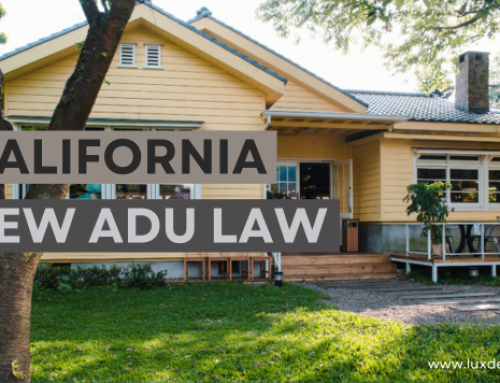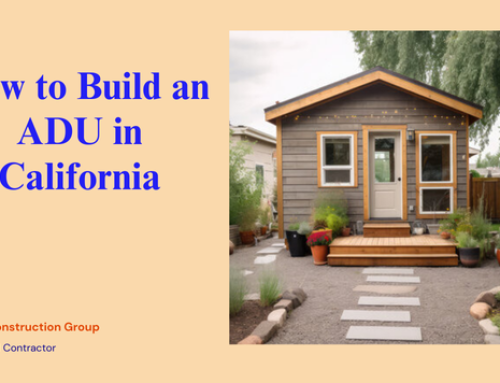Building an Accessory Dwelling Unit (ADU) can be an excellent way to increase your property’s value, provide additional living space, or generate rental income.
However, managing the construction costs of an ADU is crucial to ensure the project remains affordable and feasible.
By following these detailed tips, you can effectively control your budget while still achieving a high-quality build. Here’s an in-depth guide to help you save on your ADU construction costs.
Contents
- 9 Tips to Minimize ADU Construction Costs
- Opt for Pre-designed Units Instead of Custom-made Ones
- Be Selective with Your Materials
- Consider Utility Choices Carefully
- Simplify Plumbing by Using One Wall
- Use a Single Meter for Utilities
- Keep the Design Simple
- Be Mindful of Interior Finishes
- Ensure Your Contractor Knows Local ADU Laws
- Stick to Your Project Timeline
- Build a Premium ADU with LUX Construction Group
9 Tips to Minimize ADU Construction Costs
Constructing an Accessory Dwelling Unit (ADU) can be a significant investment, but you can manage and reduce costs effectively with careful planning and strategic decisions.
This section provides detailed tips on selecting cost-efficient designs, choosing durable materials, simplifying utility setups, and more. Let’s take a look!
Opt for Pre-designed Units Instead of Custom-made Ones
One of the most effective ways to reduce ADU construction costs is to choose pre-designed units over custom-made plans.
Custom architectural designs, while tailored to your exact specifications, can be significantly more expensive due to the bespoke nature of materials and labor involved. Pre-designed units, however, are developed with cost-efficiency in mind. These designs are standardized, meaning contractors are already familiar with the materials and construction processes required. This familiarity reduces both time and costs.
Moreover, in states like California and Washington, many cities offer pre-approved ADU designs that can streamline the permitting process. A pre-designed ADU can expedite approval times, allowing construction to begin sooner and reducing holding costs associated with project delays. The faster you can start and complete your ADU, the more you save on overall expenses.
Be Selective with Your Materials
Material selection plays a pivotal role in the overall cost of your ADU project. Opting for materials that are both affordable and durable is key.
For example, quartz countertops offer a similar appearance to marble but are less expensive and more resistant to stains and scratches. This durability ensures that the materials will last longer, reducing the need for future repairs or replacements.
When planning your ADU, consider the long-term benefits of the materials you choose. Investing in high-quality, durable materials might have a higher upfront cost but will save money in the long run by minimizing maintenance and replacement expenses. Always compare the cost and longevity of materials to make the most cost-effective choices for your ADU.
Consider Utility Choices Carefully
The installation of utilities is a major component of ADU construction costs. Choosing an all-electric setup can be more economical than extending gas lines, which can be prohibitively expensive. Electric utilities are often easier to install and integrate into existing systems, especially if your main house already relies on electric power.
Additionally, incorporating renewable energy sources like solar panels can lead to substantial savings on utility bills over time.
Although the initial installation of solar panels may require a higher investment, the long-term benefits include reduced energy costs and potential tax incentives. This approach not only saves money but also promotes environmental sustainability.
Simplify Plumbing by Using One Wall
Plumbing is often one of the most expensive aspects of constructing an ADU. To minimize these costs, design your ADU with the kitchen and bathroom adjacent to each other, sharing a single plumbing wall.
This layout significantly reduces the length of supply lines (hot and cold water), waste lines, and vent lines required, cutting down on both material and labor costs.
By centralizing your plumbing needs, you streamline the installation process and reduce the likelihood of complex, costly plumbing issues. This efficient design not only saves money during construction but also simplifies future maintenance.
Use a Single Meter for Utilities
Installing separate utility meters for your ADU can be very costly. Instead, consider using the existing meters of the main house. This approach can save you thousands of dollars. If you plan to rent out the ADU, you can install sub-meters to track the usage of electricity, water, and gas for the ADU. This way, you can fairly distribute utility costs without incurring the high expense of additional meters.
By leveraging the main house’s utilities, you avoid the high costs associated with new meter installations. Sub-meters provide an accurate way to allocate utility usage and costs, making it easier to manage expenses for both the main house and the ADU.
Keep the Design Simple
A complex design often requires more materials and labor, both of which can inflate your budget. Work with a designer who can create a beautiful yet straightforward design for your ADU. Simplified designs not only save on construction costs but also reduce the chances of delays and complications during the build. Avoid intricate details that don’t add significant value to the functionality or aesthetics of the unit.
Keeping the design simple helps to control costs by minimizing the need for specialized labor and reducing the amount of time required for construction. A streamlined design also makes it easier to manage the project and ensure it stays on schedule.
Be Mindful of Interior Finishes
High-end interior finishes can quickly drive up your ADU construction costs. If your ADU will serve as a rental unit, there’s no need to splurge on the most expensive finishes. Instead, opt for cost-effective options from retailers like IKEA or Home Depot. For those using the ADU as a home office, thrift stores can offer affordable and stylish furniture. Prioritize functionality and affordability to keep costs in check.
Choosing cost-effective finishes and furnishings helps to manage your budget without sacrificing quality or comfort. By being strategic about where to spend and where to save, you can achieve a functional and attractive interior that fits your financial plan.
Ensure Your Contractor Knows Local ADU Laws
Hiring a contractor who is well-versed in local ADU regulations is essential. ADU laws can vary widely by city and county, and non-compliance can lead to costly delays and modifications. A knowledgeable contractor will ensure that your ADU project adheres to all relevant codes and standards, preventing unnecessary expenses and keeping the project on schedule.
By choosing a contractor who understands local ADU laws, you can avoid the risks of non-compliance, which can result in fines, construction halts, and increased costs. Ensure that your contractor has a proven track record of working within your area and is familiar with the specific requirements for ADUs.
Stick to Your Project Timeline
Project delays are a common way that ADU construction budgets are exceeded. The longer your contractors are on-site, the higher the labor costs. Effective project management and a realistic timeline are crucial. Regularly monitor the progress of your build and address any issues promptly to avoid costly overruns.
Adhering to your project timeline helps to control costs by ensuring that all aspects of the construction process are completed efficiently and on schedule. By staying on track, you can avoid the additional expenses associated with prolonged construction periods.
Build a Premium ADU with LUX Construction Group
For homeowners in Los Angeles, LUX Construction Group offers top-notch services in ADU construction and remodeling. With a deep understanding of local regulations and a commitment to high-quality craftsmanship, LUX Construction Group ensures your ADU project is completed on time and within budget.
Our team provides transparent pricing with no hidden fees, and we specialize in creating beautiful, functional ADUs that meet your specific needs. By choosing LUX Construction Group, you can expect expert guidance, efficient project management, and a smooth construction process from start to finish.
Contact LUX Construction Group today to learn more about how we can help you build the perfect ADU for your property.






